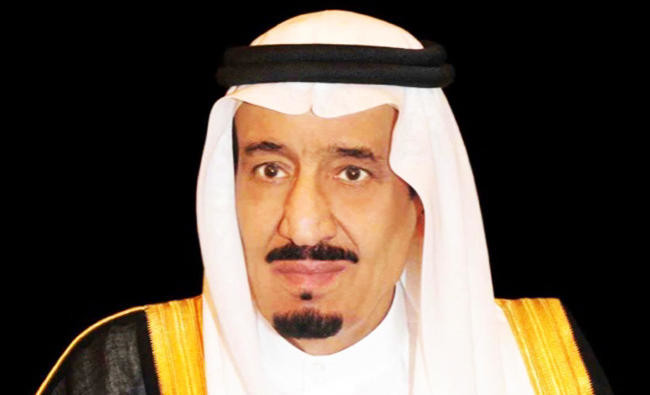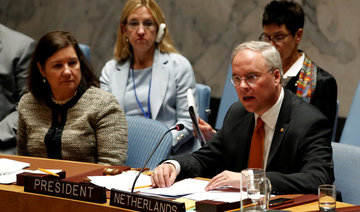JEDDAH: Saudi Arabia signed an agreement on Thursday to deposit $2 billion into the account of Yemen’s central bank, under the instruction of King Salman, the Saudi Press Agency reported.
The agreement was signed by the Kingdom’s Finance Minister Mohammed Al-Jadaan and Yemen’s Central Bank Governor Dr. Mohammed bin Mansour Zammam in Riyadh.
In January 2018, King Salman issued a directive to transfer $2 billion to Yemen’s central bank to “alleviate the suffering” of the Yemeni people.
In remarks following the signing ceremony, Al-Jadaan said that the agreement was a continuation of the Kingdom’s support for the Yemeni people, bringing the total of Saudi deposits at the central bank to $3 billion.
He said that this would enhance the financial and economic situation of Yemen, especially the Yemeni riyal exchange rate, which would be reflected positively in the living conditions of citizens.
Saudi Arabia has affirmed its continuing support for the Yemeni government and determination to assist it to restore security and stability to the country.
Last month, the King Salman Humanitarian Aid and Relief Center (KSRelief) also signed six agreements with organizations in Riyadh worth $3 million to help Yemenis displaced and injured by Houthi rebel actions.
KSRelief has targeted areas such as Maarib province, Al-Jouf, Imran, Sanaa, and Dimaar for the rehabilitation of child soldiers rescued from the Houthi rebels.
Earlier, Saudi Ambassador to Yemen Mohammed Al-Jabir told Arab News that the assistance provided by the center was not only supplying foods, medicines and clothes to distressed Yemenis.
There are some 2 million Yemenis working in the Kingdom and they send more than $10 million to their families in Yemen.
The bailout is expected to boost Yemen’s financial and economic situation while bolstering the Yemeni riyal. As the value of the riyal goes up, the living conditions of Yemeni citizens will improve.
“It’s not a loan, it’s a deposit and the legitimate Yemeni government will not have to pay it back,” a source close to the Saudi government said in January, according to Reuters.
The riyal currently trades at 500 to the dollar, down from about 215 before the war, a serious depreciation for a country that relies heavily on imports of basic foodstuffs.
In 2016 the Yemeni government moved the central bank to its second city Aden from the capital, where the Houthis operate their own rival central bank.
Saudi Arabia signs agreement to deposit $2bn in Yemen central bank
Saudi Arabia signs agreement to deposit $2bn in Yemen central bank

China grants visa-free entry to Saudi travelers

RIYADH: China is allowing visa-free entry for 30 days for travelers from Saudi Arabia, Oman, Kuwait and Bahrain in a one-year trial, the official Xinhua news agency reported on Wednesday.
The new policy begins on June 9, 2025, and will last until June 8, 2026, Chinese Foreign Ministry spokesperson Mao Ning said at a press briefing.
Passport holders from the four countries will be allowed to travel to China for business, sightseeing, visiting relatives or friends, exchanges and transit, Mao said.
China now grants visa-free access to all Gulf Cooperation Council countries, having implemented reciprocal policies with the UAE and Qatar since 2018.
“We welcome more friends from the GCC countries to embark on an impromptu trip to China,” Mao said.
Previously, Saudi Arabia had held Approved Destination Status with the East Asian nation, which came into effect on July 1, 2024.
This bilateral agreement gave access to tourists visiting the respective countries in groups.
The announcement is the latest step in strengthening ties between the two nations.
Saudi Arabia’s Vision 2030 aims to attract 5 million Chinese tourists annually by the end of the decade.
The two countries also share a strong trade relationship, and the Kingdom is China’s largest trading partner in the Gulf.
KSrelief expands aid across global crisis zones

RIYADH: Saudi Arabia’s aid agency KSrelief continues to make a significant global impact, providing critical assistance to some of the world’s most vulnerable communities.
In Somalia, KSrelief distributed 1,220 food baskets to families affected by floods in camps across the Banadir region, benefiting 7,320 people.
The Saudi aid agency also distributed 900 food baskets to vulnerable displaced families in Sudan’s Blue Nile State, benefiting 4,050 individuals.
In Yemen, KSrelief launched a project to treat childhood cancer in Mukalla district, Hadramout governorate, involving five volunteers specializing in various medical fields.
So far, the KSrelief medical team has examined 23 children and reviewed their treatment plans. They also conducted training sessions for local health care workers, benefiting 10 individuals to date, the Saudi Press Agency reported on Wednesday.
Since its launch in May 2015, KSrelief has implemented 3,435 projects worth more than $7.9 billion across 107 countries, in partnership with more than 317 organizations.
Study outlines forest fire prevention plan

RIYADH: The National Center for Vegetation Cover Development and Combating Desertification has completed a study to enhance forest protection and reduce wildfire risks in support of environmental sustainability goals.
Titled “Forest Fire Prevention and Post-Fire Recovery in the Southern and Southwestern Regions of Saudi Arabia,” the study was conducted in collaboration with King Khalid University and Monash University in Australia.
It includes an assessment of forest conditions and risk factors, the development of a digital database, and a review of preventive measures and community practices, the Saudi Press Agency reported on Wednesday.
The study proposes an integrated response plan involving relevant agencies, with defined roles and the use of modern tools such as early warning systems and drones.
It also offers field designs and sustainable alternatives for strategic firebreaks, a post-fire recovery guide, a performance evaluation tool, and a framework for joint operations.
To support this, the study outlines a mechanism for engaging local volunteer teams in forest areas through training, capacity-building, and coordination with authorities.
The study demonstrates institutional, technical, and community collaboration in forest protection. It reflects Saudi Arabia’s efforts to preserve natural resources and address climate-related challenges while balancing development with ecosystem conservation.
The national center continues to promote sustainable vegetation cover and has launched an initiative to plant 60 million trees — equivalent to restoring 300,000 hectares — by 2030.
New school for neurodiverse children to open in Riyadh

- Enrollment is now open for the 2025 academic year
RIYADH: A new school specializing in educating neurodiverse children aged 3 to 9 will open in Riyadh in September, it was announced on Tuesday evening.
Josour Schools held a seminar in Riyadh this week to make the announcement, highlighting its unique model, which combines education, therapy and family services.
The school, which will be located in Roshn’s Sedra 1 community, is the result of a partnership between the Josour Company and UK-based CareTech.
“CareTech is always rooted in the communities in which we operate our services,” Shokat Akbar, CEO of CareTech International, told Arab News. “For (Josour) to succeed, it must be rooted in the community and be … in partnership with the community.”
Aligned with Saudi Arabia’s Vision 2030 goals, Josour Schools adopts a British curriculum adapted to local cultural values.
Its small-class model, led by neurodiversity specialists, focuses on individualized education plans and combines education with therapeutic interventions.
“This school serves a critical purpose: providing good quality access to special education needs services for children,” Akbar said. “Inclusivity comes in many ways.
“Students (will) participate in society through art and sport, making their contributions visible.”
The school will have access to resources from CareTech’s global network of 47 UK schools and 550 specialized services.
“Teachers will attend CareTech UK schools as part of their induction and training,” Akbar said, adding that Josour’s therapists would collaborate with experts across CareTech’s global network, including researchers and practitioners.
Enrollment is now open for the 2025 academic year.
Ministry of Islamic Affairs launches 24/7 toll-free helpline for pilgrims

- Helpline will respond to pilgrims’ inquiries related to Hajj
RIYADH: Saudi Arabia’s Ministry of Islamic Affairs, Dawah and Guidance has launched a 24/7 toll-free helpline (800 2451000) to respond to pilgrims’ inquiries and provide religious rulings (fatwas) related to the Hajj.
The service provides religious guidance in 10 languages: Arabic, English, French, Turkish, Urdu, Indonesian, Bengali, Hausa, Amharic and Hindi.
The toll-free helpline is part of the ministry’s initiatives aimed at facilitating the performance of Hajj rituals in accordance with Islamic rules.
Through direct communication with a select group of qualified scholars and professional translators, the helpline ensures pilgrims receive reliable religious support.
The ministry has urged all pilgrims to make full use of this complimentary service, underscoring the Kingdom’s intent to deliver the highest standard of care during the pilgrimage.
The minister of Islamic affairs has assigned 300 scholars and advocates to provide fatwas and lectures for domestic Hajj campaigns for this year’s Hajj season, the ministry said.
Meanwhile, the ministry continues its efforts to serve pilgrims during Hajj by providing awareness and guidance services at the Aisha Mosque, one of the main stations frequented by pilgrims in Makkah.
The services include broadcasting awareness messages in several languages via electronic screens to enhance religious awareness and facilitate the performance of rituals.
In addition, around-the-clock field-monitoring tours are being conducted by male and female inspection teams to ensure the quality of services and address observations immediately.
The ministry also ensured the availability of Qur’ans and translations in several languages and organized the movement of crowds in the mosque and its courtyards to ensure smooth flow and comfort for visitors.




















